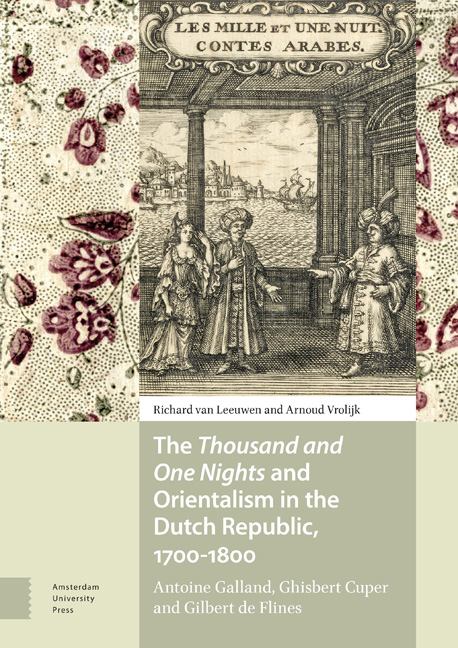 Thousand and One Nights and Orientalism in the Dutch Republic, 1700–1800
Thousand and One Nights and Orientalism in the Dutch Republic, 1700–1800 Book contents
- Frontmatter
- Contents
- Introduction
- 1 The Thousand and one nights and literary Orientalism in Europe
- 2 Dutch Orientalism before 1700
- 3 Antoine Galland and Ghisbert Cuper
- 4 The early editions of the Nights
- 5 Gilbert de Flines
- 6 Later editions in the eighteenth century
- 7 Dutch Orientalism in the eighteenth century
- Conclusion
- Appendix 1 Bibliographic survey of Dutch editions, 1705-1807
- Appendix 2 The David Coster engravings
- Appendix 3 Text samples of the Dutch Nights
- Appendix 4 French and Dutch quotations
- Illustration credits
- Bibliography
- Index
4 - The early editions of the Nights
Published online by Cambridge University Press: 21 November 2020
- Frontmatter
- Contents
- Introduction
- 1 The Thousand and one nights and literary Orientalism in Europe
- 2 Dutch Orientalism before 1700
- 3 Antoine Galland and Ghisbert Cuper
- 4 The early editions of the Nights
- 5 Gilbert de Flines
- 6 Later editions in the eighteenth century
- 7 Dutch Orientalism in the eighteenth century
- Conclusion
- Appendix 1 Bibliographic survey of Dutch editions, 1705-1807
- Appendix 2 The David Coster engravings
- Appendix 3 Text samples of the Dutch Nights
- Appendix 4 French and Dutch quotations
- Illustration credits
- Bibliography
- Index
Summary
During the late seventeenth and eighteenth centuries the Dutch Republic was highly susceptible to the literary fashions of France. The use of French was widespread among the cultural élite, and this influence was reflected accordingly in the number of local French editions, or Dutch translations for those who did not know French well enough but were eager to keep abreast of cultural developments. The Dutch book market was well organised and influential throughout Europe, and during the heyday of the Enlightenment numerous French authors took recourse to the ‘libraires de Hollande’ to avoid the censorship of the Ancien Régime. Many Dutch publishers were of French or Walloon Protestant extraction, which greatly facilitated communications. This trend began to change in the second half of the eighteenth century, when publishing in French decreased and voices were raised in support of a national Dutch cultural ‘revival’. This literary trend also affected works in the Oriental style, albeit never as a dominant current.
The epistolary novel Lettres Persanes by Montesquieu (1689-1755) is perhaps the most famous example of a work in the Orientalist style, which was first published in Amsterdam in 1721 by the Huguenot publisher Pierre Brunel (1658/59-1740). This critique of the absolutism of Louis XIV is, however, not an Orientalist work in the strictest sense of the word: Montesquieu used the Oriental theme only as a thin veneer to create a distance between his ‘Persian’ protagonists and the French society they visited and observed. A Dutch translation was printed fifteen years later, in 1736.
Voltaire's play Le fanatisme, ou Mahomet le prophète, tragédie leaves little room for doubt about the author's attitude towards Islam, although some maintain that it is directed against all forms of religious intolerance. The play was first performed in Lille in 1741 and again the following year in Paris at the Comédie Française, but was afterwards banned in France. In 1743 an edition, apparently based on Voltaire's own manuscript, was published in Amsterdam by the Walloon bookseller Etienne Ledet. An attractive but melodramatic frontispiece of Mahomet– designed by ‘L.F.D.B.’ (Louis Fabritius Dubourg, 1693-1775) and executed by Pieter Tanjé – shows how the desperate slave Palmire kills herself in front of the Prophet Muhammad after she has found out that her beloved is actually her own brother.
- Type
- Chapter
- Information
- Thousand and One Nights and Orientalism in the Dutch Republic, 1700–1800Antoine Galland, Ghisbert Cuper and Gilbert de Flines, pp. 53 - 78Publisher: Amsterdam University PressPrint publication year: 2019


